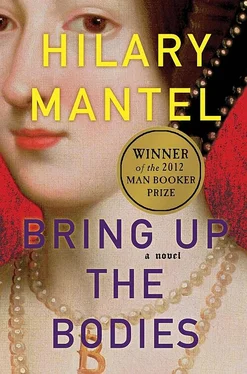But he owns them now. In one moment of bravado, to get the applause of the crowd, he has impugned the succession, derogated the king’s heirs: even though he was cautioned not to do it. He, Cromwell, nods. ‘We have heard that you spread rumours that the Princess Elizabeth is not the king’s child. It seems you do. You have spread them even in this court.’
George is silent.
He shrugs and turns away. It is hard on George that he cannot even mention the charges against him without becoming guilty of them. As prosecutor, he would rather it had gone unmentioned, the king’s difficulty; yet it is no more of a shame to Henry to have it declared in court than have it said in the street, and in taverns where they are singing the ballad of King Littleprick and his wife the witch. In such circumstances, the man blames the woman, as often as not. Something she has done, something she has said, the black look she gave him when he faltered, the derisive expression on her face. Henry is afraid of Anne, he thinks. But he will be potent with his new wife.
He gathers himself, gathers his papers; the judges wish to confer. The case against George is flimsy enough in all truth, but if the charges are thrown out, Henry will arraign him on some other matter, and it will go hard with his family, not just the Boleyns but the Howards too: for this reason, he thinks, Uncle Norfolk will not let him escape. And no one has denounced the charges as incredible, at this trial or the trials that preceded it. It has become a thing one can believe, that these men would plot against the king and copulate with the queen: Weston because he is reckless, Brereton because he is old in sin, Mark because he is ambitious, Henry Norris because he is familiar, he is close, he has confused his own person with the person of the king; and George Boleyn, not despite being her brother, but because he is her brother. Boleyns, it is known to all, will do what they need to do to rule; if Anne Boleyn put herself on the throne, walking on the bodies of the fallen, can she not put a Boleyn bastard there too?
He looks up at Norfolk, who gives him a nod. The verdict is in no doubt then, nor the sentence. The only surprise is Harry Percy. The earl rises from his place. He stands, his mouth open slightly, and a silence falls, not the rustling, whispering apology for a silence which the court has endured till now, but a still, expectant hush. He thinks of Gregory: do you want to hear me make a speech? Then the earl pitches forward, unleashes a groan, he crumples, and with a clatter and a thud he hits the floor. At once his prone body is swamped by guardsmen, and a great roar arises, ‘Harry Percy is dead.’
Unlikely, he thinks. They’ll bring him round. It is now mid-afternoon, warm and airless, and the evidence placed before the judges, the written statements alone, would fell a healthy man. There is a length of blue cloth laid over the new boards of the platform on which the judges sit, and he watches the guardsmen rip it up from the floor and improvise a blanket in which to carry the earl; and a memory stabs him, Italy, heat, blood, heaving and rolling and flopping a dying man on to knotted saddlecloths, cloths themselves scavenged from the dead, hauling him into the shade of the wall of – what, a church, a farmhouse? – only so that he could die, cursing, a few minutes later, trying to pack his guts back into the wound from which they were spilling, as if he wanted to leave the world tidy.
He feels sick, and he sits down by the Attorney General. The guardsmen carry the earl out, head lolling, eyes closed, feet dangling. His neighbour says, ‘There is another man the queen has ruined. I suppose we will not know them all for years.’
It is true. The trial is a provisional arrangement, a fix for getting Anne out, Jane in. The effects of it have not been tested yet, the resonances have not been felt; but he expects a quaking at the heart of the body politic, a heaving in the stomach of the commonwealth. He gets up and goes over to urge Norfolk to get the trial under way again. George Boleyn – suspended as he is between trial and conviction – looks as though he might collapse himself, and has begun to weep. ‘Help Lord Rochford to a chair,’ he says. ‘Give him something to drink.’ He is a traitor, but still an earl; he can hear his death sentence sitting down.
Next day, 16 May, he is at the Tower, with Kingston in the constable’s own lodgings. Kingston is fretting because he does not know what sort of scaffold to prepare for the queen: she lies under a dubious sentence, waiting for the king to speak. Cranmer is with her in her lodgings, come to hear her confession, and he will be able to hint to her, delicately, that her cooperation now will spare her pain. That the king still has mercy in him.
A guardsman at the door, addressing the constable: ‘There is a visitor. Not for yourself, sir. For Master Cromwell. It is a foreign gentleman.’
It is Jean de Dinteville, who was here on embassy round about the time Anne was crowned. Jean stands poised in the doorway: ‘They said I should find you here, and as time is short –’
‘My dear friend.’ They embrace. ‘I did not even know you were in London.’
‘I am straight off the boat.’
‘Yes, you look it.’
‘I am no sailor.’ The ambassador shrugs; or at least, his vast padding moves, and subsides again; on this balmy morning, he is wrapped up in bewildering layers, much as a man dresses to face November. ‘Anyway, it seemed best to come here and catch you before you are back playing bowls, which I believe you generally do when you should be receiving our representatives. I am sent to speak to you about young Weston.’
Good God, he thinks, has Sir Richard Weston managed to bribe the King of France?
‘Not a moment too soon. He is sentenced to die tomorrow. What about him?’
‘One is uneasy,’ the ambassador says, ‘if gallantry should be punished. Surely the young man is guilty of nothing more than a poem or two? Paying compliments and making jests? Perhaps the king might spare his life. One understands that for a year or two he would be advised to keep away from the court – travelling, perhaps?’
‘He has a wife and young son, Monsieur. Not that the thought of them has ever constrained his behaviour.’
‘So much the worse, if the king puts him to death. Does Henry not regard his reputation as a merciful prince?’
‘Oh yes. He talks about it a lot. Monsieur, my advice is to forget Weston. Much as my master reveres and respects yours, he will not take it kindly if King Francis were to interfere in something which is, after all, a family matter, something he feels very near his own person.’
Dinteville is amused. ‘One might well call it a family matter.’
‘I notice you do not ask mercy for Lord Rochford. He has been an ambassador, one thought the King of France would be more interested in him.’
‘Ah well,’ the ambassador says. ‘George Boleyn. One understands there is a change of regime, and what that entails. The whole French court hopes, of course, that Monseigneur will not be destroyed.’
‘Wiltshire? He has been a good servant to the French, I see you would miss him. He is in no danger at present. Of course, you cannot look for his influence to be what it was. A change of regime, as you say.’
‘May I say…’ the ambassador stops to sip wine, to nibble a wafer that Kingston’s servants have provided, ‘that we in France find this whole business incomprehensible? Surely if Henry wishes to be rid of his concubine he can do it quietly?’
The French do not understand law courts or parliaments. For them, the best actions are covert actions. ‘And if he must parade his shame to the world, surely one or two adulteries are enough? However, Cremuel,’ the ambassador runs his eye over him, ‘we can speak man to man, can we not? The great question is, can Henry do it? Because what we hear is, he prepares himself, and then his lady gives him a certain look. And his hopes collapse. That seems to us like witchcraft, as witches do commonly render men impotent. But,’ he adds, with a look of sceptical contempt, ‘I cannot imagine that any Frenchman would be so afflicted.’
Читать дальше
Конец ознакомительного отрывка
Купить книгу












